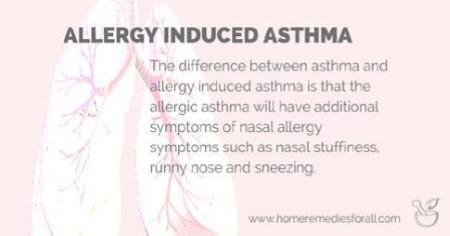Summertime is the time for allergic asthma for some. It is not a great feeling when you want to be outdoors in the nice weather and the allergy-induced asthma attacks.
Some people may get asthma attacks due to allergies throughout the year. In cases of such people, it is not the weather, but the allergens in the outside world that are causing it. Summer time does increase the incidences in those cases.
The symptoms can range from sneezing, wheezing, runny nose or nasal stuffiness, watery or itchy burning eyes, itchy mouth or throat, difficulty in breathing, and coughing to a feeling of tightness in the chest.
Most of the time these asthma attacks can be tamed with home remedies, but occasionally you may need medical help.
The difference between asthma and allergy-induced asthma is that allergic asthma will have additional symptoms of nasal allergy symptoms such as nasal stuffiness, runny nose, and sneezing.
Both conditions can coexist. This makes the treatment a challenge.
Allergic asthma runs in families. Genetics plays a big role. Doctors will usually ask for family history as a diagnostic question to eliminate possibilities. Skin and blood tests will be used to establish it.
1. The best cure is prevention.
Once the sources of allergens are known, avoid exposure to it. This is easier said than done. If you live in an area where the pollen concentration is high, then you have no choice. You have to breathe the pollen. It is an external force over which you have no control.
The best you can do is stay away from your home during the pollen distribution time (11:00-15:00 hrs in most places). Keep your doors and windows shut to ensure that the pollen doesn't settle inside the house during distribution time.
Other allergens such as dust mites require you to do some work. This is within your control. Keep your home clean of dust mites.
Vitamin D deficiency has been found to have links with asthma. Though., there is no evidence of Vitamin D supplements of any help, it is still better to take them. The best way to reduce vitamin D deficiency is to get 15-20 minutes of sun exposure daily in the morning hours. You should expose yourself to sunlight before 9:00 am to avoid overexposure to other harmful rays.
Animal proteins also have been linked to asthma. Avoid and replace animal proteins with plant proteins.
2. The other method for allergic asthma is to control it.
Normally inhalers are used to control asthma attacks. However, antihistamines are taken in the case of allergic asthma. Most of the natural home remedies for asthma and allergies will work well in the case of allergy-induced asthma also.
It makes sense to control allergy so that it doesn't induce asthma. Therefore, intuitively it makes sense to take remedies for allergies. However, the fact is since allergy has already created asthmatic attacks, you need to now control asthma first. Taking antihistamines will also help to get rid of allergies, but the first things first. Manage your asthma.
3. For quick relief from the allergic asthma attack, you can use Lobelia (Lobelia Inflata)
Lobelia also called Indian tobacco, has been used as an herbal remedy for respiratory conditions, including asthma, bronchitis, pneumonia, and cough for a long time in North America. The native Americans smoked Lobelia as a treatment for asthma. Lobeline is an effective active ingredient in the Lobelia plant.
Lobelia is normally available in different forms such as liquid extracts, tinctures, and dried herbs. The dried herb is available both in raw as well as capsules. The raw herb can be used in making tea.
Lobelia is generally mixed with other herbs for managing asthma.
You can use a mixture of tincture of Lobelia and tincture of capsicum in three is to one ratio. Add 15-20 drops of the mixture in water and drink it slowly at the start of an asthmatic attack. You can repeat the doses after 30 minutes. Don't take more than 3-4 times a day.
If you have high blood pressure, liver or kidney disease, ulcers or you are a breastfeeding mother, then avoid the use of Lobelia.
1-Lobelia | University of Maryland Medical Center http://umm.edu/health/medical/altmed/herb/lobelia#ixzz3XeDHTD6T

